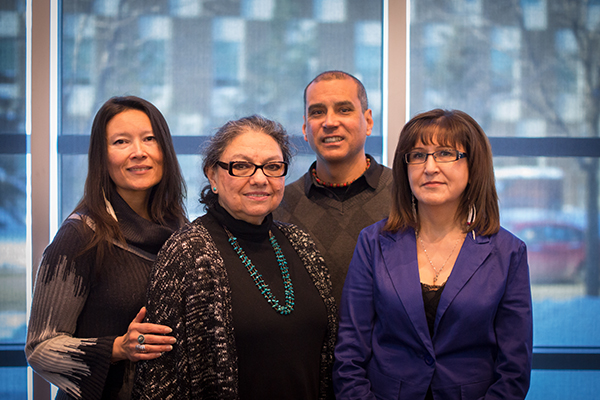Happy retirement, Dr. Cora Weber-Pillwax!
9 September 2024
 The Faculty of Education extends sincere gratitude and best wishes to Dr. Cora Weber-Pillwax, who retired at the end of June.
The Faculty of Education extends sincere gratitude and best wishes to Dr. Cora Weber-Pillwax, who retired at the end of June.
A Métis scholar from Calling Lake in northern Alberta, Dr. Weber-Pillwax is a longstanding and well-respected member of our community. She earned both master’s and doctoral degrees from the faculty before becoming a professor in the Department of Educational Policy Studies.
Over more than two decades with the Indigenous Peoples Education (IPE) graduate specialization, Dr. Weber-Pillwax mentored and inspired generations of Indigenous scholars – some of whom now follow in her footsteps as professors in our faculty.
Throughout her extensive career as a researcher, Dr. Weber-Pillwax prioritized Indigenous knowledge mobilization, undertaking work that was deeply embedded in communities and in re-connecting people with traditional knowledge.
Her scholarly expertise spans Indigenous research methodologies, education and health research, Indigenous languages and Métis history and rights in Canada. She led major research projects funded by the Social Sciences and Humanities Council, Community University Research Alliance, and with Canadian Institutes of Health Research and the Institute of Indigenous Peoples Health.
Together with Drs. Evelyn Steinhauer, Rebecca Sockbeson and Dwayne Donald, Dr. Weber-Pillwax co-founded the mandatory Indigenous education course for BEd students, EDU 211 “Aboriginal Education and Contexts for Professional Development.” She was also the primary developer of several graduate-level educational policy studies courses for the IPE specialization.
Educational policy studies professor Dr. Randy Wimmer shares these reflections on his colleague:
“My memories of working with Cora go back well before I became a professor. In the 1990s I worked in the teacher education office at the U of A where one of the many exciting projects I worked on was creating ways to reach northern communities to offer teacher education programs. At that time, Cora was in a leadership role in Northlands School Division, one of the locations we wanted to offer some of the program. I immediately came to admire Cora’s knowledge of, and passion for, teacher education and that continued to be the case throughout my career as a professor and teacher educator. More specifically, in creating that northern site for teacher education while supportive, Cora stressed the importance of a community focused approach to the program and was one of the first educators and leaders to introduce me to Aboriginal Teacher Education, a place where I’ve located some of my scholarship and teaching.
In coming to the U of A, Cora also gave me the opportunity to work with Dr. Shauna Bruno, one of my first doctoral students. Shauna was also the first graduate student I worked with in the Indigenous Peoples Education program at the University of Alberta. Cora and I co-supervised Shauna’s dissertation where it seemed that Cora mentored me as much as she did Shauna. I was inspired by Cora’s outstanding writing and editing abilities and by her expectations for excellence in graduate student research. Shauna and I had a wonderful visit this past year and I was reminded about being grateful for the opportunity Cora gave to me to work with Shauna and other graduate students in Educational Policy Studies.”